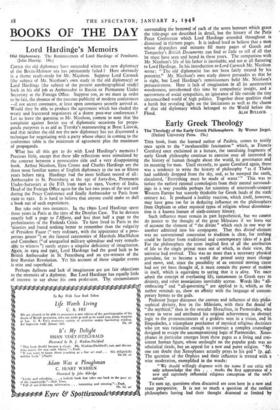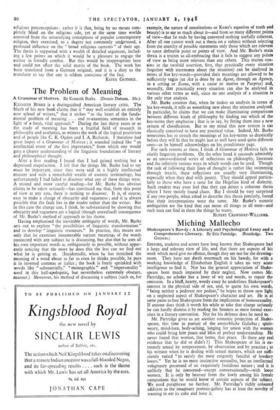Early Greek - Theology THIS book, from the learned author of
Paideia, comes to testify once again to the "inexhaustible fascination" which, as Francis: Cornford once exclaimed in a lecture, the tantalising fragments of early Greek philosophy continue to exercise over all interested in:
the history of human thought about the world, its governance and its meaning for man. Until recently, to quote Cornford again, there was a tendency to write the history of philosophy " as if Thales had suddenly dropped from the sky, and, as he oumped the earth, ejaculated, ' Everything must be made of water.' " This - was to isolate the earliest rational cosmologists from their mental surround- itigs in a way possible perhaps for scientists of nineteenth-century Western Europe but scarcely thinkable for Greek lands of the sixth century B.c. It produced a healthy reaction, which itself, however, may have gone too far in deducing influence on the philosophers frbm Orphism or_other mystical types of religion whose dissemina-: tion is a known feature of sixth-century history. "
Such influence must remain in part hypothetical, but we cannot do justice to the thought of the great Milesians if we leave Out of account the element of "the divine" which each in one way: 'or another admitted into his costvogony. That this divine .element was no conventional concession to tradition is clear, for nothing could be farther from traditional and contemporary ideas of a god.
For the philosophers the term implied first of all the attribution of life to the single primal mass out of which, in their view, the universe had evolved. This was no more than a necessary physical postulate, for to become a world the primal unity must change and move, and, since the possibility of an external moving cause had not yet been thought of, it must contain the power of motion in itself, which is equivalent to saying that it is alive. Yet once admit the concept of everlasting life, tantamount in Greek eyes to divinity, and other associations inevitably accrue. Words like " all- embracing " and " all-governing " are applied to it, which, as the author reminds us, show an affinity with the language of contem- porary hymns to the gods.
Professor Jaeger discusses the content and influence of this philo- sophical divinity, first in the Milesians, with their flat denial of " the mythical," then in the oracular lieraclitus in Parmenides, who wrote in verse and attributed his original achievement in abstract logic to the pronouncements of a goddess seen in a vision, and In Empedocles, a triumphant proclaimer of mystical religious doctrines who yet was rationalist enough to construct a complex cosmology designed to escape the uncompromising logic of Parmenides. Xe.no- phanes in particular emerges from these pages as a living and con- sistent human figure, whose onslaught on the popular gods was no atheistical tirade, but an appeal for a new and purer religion. "No one can doubt that Xenophanes actually prays to his god " (p. 44). The question of the Orphics and their influence is treated with a wise moderation, exemplified in the words: " We should willingly dispense with the name if our critic will only acknowledge that this . . . marks the first appearance of a new and extremely influential religious conception of the soul's nature."
To sum up, questions often• discussed are seen here in a new and truer perspective. It is not so much a question of the earliest philosophers having had their thought distorted or limited by religious preconceptions : rather it is that, being by no means com- pletely blind on the religious side, yet at the same time worlds removed frum the unsatisfying conceptions of popular contemporary religion, they exercised, to a degree not commonly understood, a profound influence on the " broad religious currents " of their age. The thesis is supported with a wealth of detailed argument, includ- ing a few points on which it would be a pleasure to engage the author in friendly combat. But this would be inappropriate here and could not affect the solid merits of the book. The work has been translated from a German original, and it is a duty to the translator to say that one is seldom conscious of the fact.







































 Previous page
Previous page